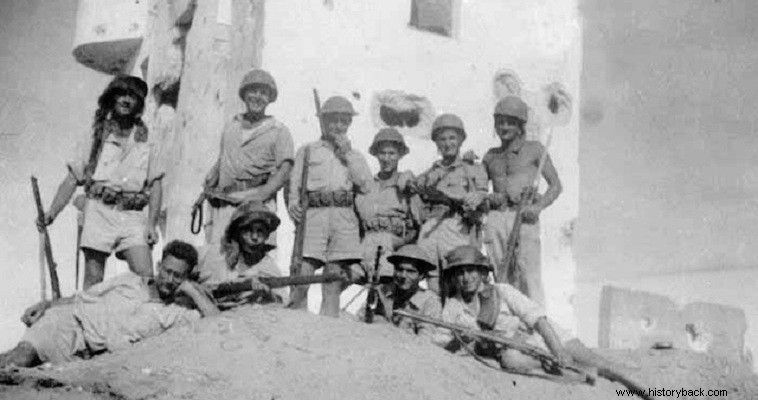
The battle of Yad Mordechai is one of the most incredible in history. It pitted regular troops supported by tanks and artillery against rogue fighters, citizens in reality fighting for their lives and their fledgling state.
On May 14, 1948, Israel declared its independence. This decision was also accepted by the UN. The neighboring Arab countries, however, had a different opinion and simultaneously attacked the small state from all sides with strong forces. The war, a War of Independence for Israelis, was the first Arab-Israeli conflict since the establishment of the Jewish state.
Yad Mordechai was a kibbutz, a rural community of Jews named after the leader of the Warsaw ghetto uprising, Mordechai Anielewicz. The kibbutz was founded in 1930 on a hill near the road that connected Gaza with Ashkelon. Jewish peasant families lived there.
Even before the war was declared, the Egyptians sent their soldiers to the lands of today's Israel. The Egyptian corps numbered 10,000 men and was supported by significant artillery and tanks and could also be supported by air.
The Egyptians, under General Ahmed Ali al-Mu'awi, easily conquered or ignored other kibbutzim they found on their way. The Egyptian general, arriving at Yad Mordechai, however, realized that he could not ignore this fact as, due to his position, he controlled the important coastal road that led to Tel Aviv.
The Egyptian general ordered the bulk of his forces to turn towards Jerusalem, commanding a force of 2,500 men reinforced with a regiment and a squadron of artillery and a detachment of chariots. to take over the kibbutz.
Fierce battle
The defenders in the kibbutz numbered only 90 men and 20 women who carried weapons. They were joined by 20 fighters from the Jewish paramilitary organization Haganah. On the evening of May 18, 92 children and the other women were evacuated.
110 men and 20 women stayed in the kibbutz. All carried only rifles, with the exception of the Haganah fighters who had a machine gun and a British-made RIAT portable anti-tank launcher .
The Egyptians attacked on May 19, 1948, shortly after dawn. Two Egyptian infantry battalions, closely supported by tanks and artillery fire, charged against the kibbutz. The Egyptians managed to get through the fence of the farm. But there they stopped having suffered dozens of losses from the determined defenders who had five dead and 11 wounded.
The Cairo radio station, however, announced the fall of the kibbutz. Thus the Egyptians were now obliged, and for reasons of propaganda, to insist that they understand what they announced they had already conquered.
On May 20, the Egyptians launched continuous attacks. Some sources report four, others say seven attacks. In each case they were all repulsed with the attackers suffering very heavy losses. The defenders had 13 dead and 20 wounded.
On the evening of May 20, however, the defenders were reinforced with a paramilitary platoon, which was joined by six deserters from the British army. The platoon had one more RIAT and three machine guns. Even so, the Egyptians were again overwhelmingly superior
But their artillery proved to be more than inadequate and there was no cooperation between infantry and tanks. Consequently their attacks were uncoordinated in "packs"...
The Egyptians over the next two days bombarded the kibbutz with artillery while their air force attacked an Israeli phalanx carrying reinforcements. The main building of the farm was leveled. On the 23rd the Egyptians attacked again having succeeded in the cooperation of chariots and infantry. In this way they managed to take over most of the farm.
The defenders, exhausted and facing a shortage of ammunition, decided to leave the farm on the evening of the 23rd. Indeed they succeeded without being noticed by their opponents.
The Egyptians were so clueless that on May 24 they launched a four-hour artillery bombardment against the empty Israeli positions before attacking and overrunning them... In total the Israelis had 26 dead and 49 wounded. The Egyptians lost at least 300 to 400 of their men.
However, the time the Israelis gained from the defenders in the kibbutz literally saved the situation as they caught up and gathered forces to stop the Egyptian invasion.
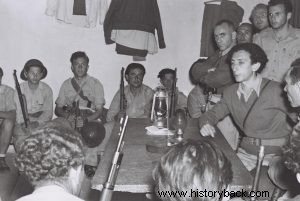
Kibbutz and Haganah members at Yad Mordechai.
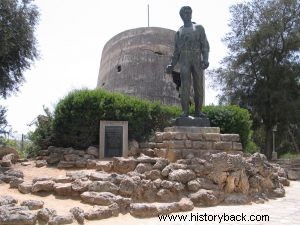
The ruins of the kibbutz – today a museum – with the statue of Mordechai Anielevich.
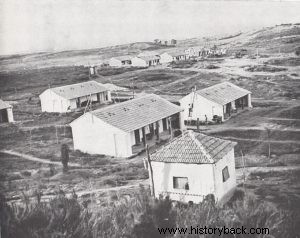
The kibbutz before the battle.
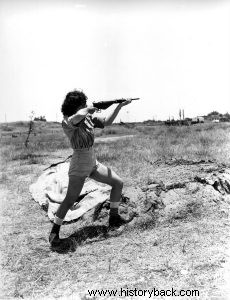
Israeli during the War of Independence in 1948.
